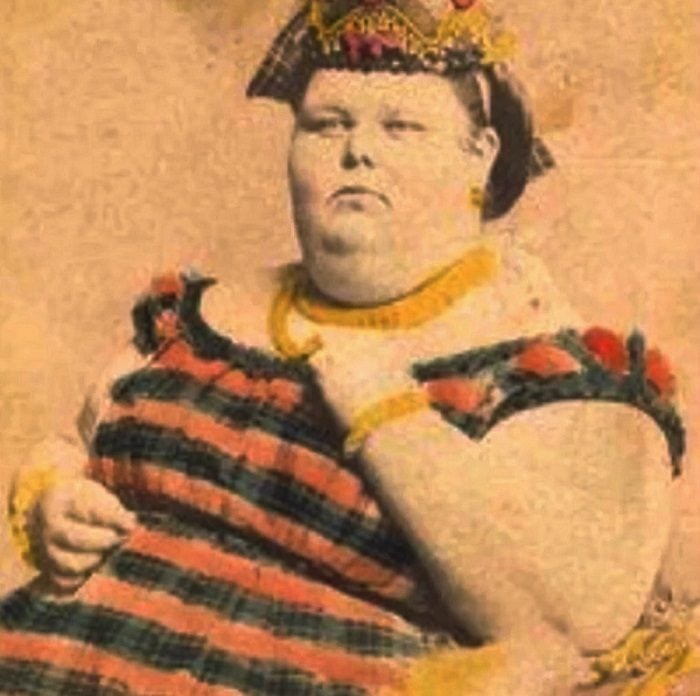People are really funny about fat: villainizing it, loathing it, grabbing it, poking it, trying to get rid of it, judging it and ourselves and others for having it.
Fat is a hot topic, always. I call it “fat madness.”
A few years ago, I was interviewing my teacher Ana Forrest for an article, and she said something provocative.
“Unresolved or undigested emotions store in our cell tissues as pain, fat, dullness or disconnect.”
I said, “Fat?”
She said, “Yes, fat.”
Aside: A sign of my own “fat madness,” my brain skipped over all those other interesting words—pain, dullness, disconnect—and only heard fat.
Now before you get your hackles up about Ana’s statement, I don’t think that she was saying all fat people are harboring pounds and pounds of undigested emotion. Some may be, yes, but others definitely not. This takes discernment to parse. Certainly the Buddha is depicted as fat–and happy.
I think what she was suggesting is actually far more complicated and interesting:
Our bodies have to put the things that we don’t deal with somewhere. My acupuncturist told me we put it in our bones. Ana suggests we’re storing it in our fat. There’s probably truth to both.
Here’s a story, and a musing.
As a woman, I have a very specific relationship with fat. This is it: we’re supposed to have it. I’m always annoyed when those celebrity pictures circulate shaming and ridiculing some person in the public eye about the cellulite on the back of her thighs. Beauties like Jennifer Lopez and Beyonce come to mind. I’m sure you’ve seen those mean-spirited posts, too.
Worse yet are diatribes on the Williams sisters: who in their right mind could ever call those mind-blowingly, cosmically great athletes fat? I also get sad when I hear otherwise in-shape women complaining about their own cellulite. It is misogyny.
Suffice it to say, it’s taken me a while to arrive at the aforementioned viewpoint. I chronicle a bit of my own struggles in How I Came to Love My Body—Just the Way it Is.
In this article I mention a sudden 20 pound weight gain. I’m just shy of 5’9”, so this is not an insignificant amount.
“In How I Came to Love My Body” I also say that the weight gain was “inexplicable.”
This was not entirely true, but to discuss the truth would have been a departure from the topic.
That weight gain came on the heels of a devastating let-down in the man department. How embarrassing to admit. But, I think many of us have had an experience of the heart-break variety, yes?
For our purposes here, I think the most important details of this colossal disappointment are the metaphysical ones. I don’t know if it’s even accurate to call them “details” as much as “stories I told myself.”
- I felt immediate magnetism with this person, which he corroborated
- Our life and Spirit purposes melded well
- I believe that humans are here to love and be loved
- I perceived immense power and possibility of this with him
- His behavior therefore felt like a cosmic insult, not merely an encounter with an ordinary asshole
- Consequently, I felt abandoned by Spirit in the aftermath and therefore lost hope and faith
Interestingly enough, and relating to Ana Forrest’s comment about fat and emotional warehousing, is I gained weight in a place I’ve never had it before—right around my bottom set of front ribs.
You know your body and know the places that it likes to store anything extra. Imagine if suddenly it did so in a new spot.
Strange, right?
One might say that, unable to fully process the experience, I tucked it away. On my ribs.
Fast-forward about three years. I had the honor of serving as lead assistant for the Forrest Yoga New York City Advanced Teacher Training. Forrest Yoga TTs are no ordinary experiences. They are exciting, weird, mysterious, healing ceremonial events that change and meld the lives of all involved in mystical ways. Ana is a powerful guide, and often, confrontational teacher.
You may not like the ways that you are made to see yourself, but those new views will inevitably leave you changed forever.
During the training I had some interesting insights about my own chronic illness, which I talk about in Injury as Opportunity. These insights have become stepping-stones to grander cumulative insights.
After the training was over, Ana, I and her boyfriend were practicing together, really just recovering from the intensity and talking.
We were discussing romantic partnership, and she commented, about the aforementioned jerk, and said how his choice was tragic. He turned away from a power choice.
But ultimately, Sir Jerk’s decision freed me up to become more powerful myself. And hearing my teacher say he turned away from power only freed me more, because she was also saying that she sees and appreciates my own power.
Hearing this was like cutting a cord. The psychic, sorrowful weight from the experience started to lift.
Now, what on earth does this have to do with my weight gain and—incidentally—subsequent loss?
Let me ask you—how many of you have truly, to the core of your being, processed and let go of a love disappointment of great magnitude? If you really think you have, you’re probably lying to yourself. And you’ve stored that emotion somewhere…
This spot around my bottom ribs is a location of chronic, systemic weakness. It impedes my inversion practice. It makes my backbends crushingly saggy. The appearance of adipose tissue in this area was merely another sign of what as already present—dullness, disconnect, even denial on the front ribs, pain in the back ones.
The solar plexus is a power spot on the body. It is the location of your ego identity, the relationship with the self.
Ultimately, the blow that love disappointment dealt me reflected on my sense of self, which historically had been low, for some reasons that I outline in my aforementioned articles.
During the Forrest Yoga Advanced TT, I lost some weight. Not just physical weight, but emotional weight, too. It’s visible—people can always see when you’ve lightened up inside. The little adipose pad around the bottom ribs diminished.
It’s hard to track exactly how this happened—long-term, internal transformation doesn’t lend itself well to YouTube videos, blogs, or double blind placebo studies—but part of the magic and mystery of an emotionally and physically therapeutic yoga practice, is that it helps your body to release these backlogs, and to let go of the excess tissue (fat) where you’ve been storing unprocessed emotions and memories, not just about romantic failures, but about anything.
It’s an inside job. When the pain, dullness, and disconnect in your body diminish, the outward signs of it can evaporate too. And that’s the part of “weight loss” that is so rarely discussed. No wonder—it’s difficult to document as real.
But it is. As Carolyn Myss says, your biography becomes your biology. We’re often just too close to see it.
~
Relephant Reads:
Why I Will Always Choose to be a Little Bit Fat.
The Real “Fat-Shaming” that No One Talks About.
A Nutrition Myth that Keeps us Fat, Sick & Tired.
~
Want 15 free additional reads weekly, just our best?
Get our weekly newsletter.
Editor: Sara Crolick
 Share on bsky
Share on bsky


Read 20 comments and reply